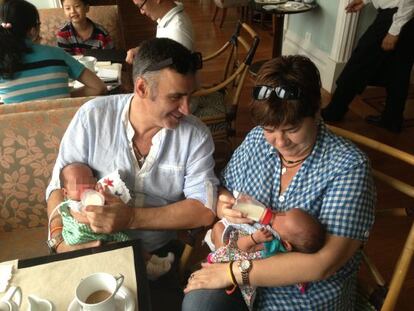Couple faces legal battle to take babies out of India
Twins are stuck in their birth country until Spain can confirm that their adoption is legal

What seemed as though it was a mere formality for Ana Coto and her husband, José Luis Vidal, has turned into a nightmare. The couple had traveled to Mumbai to collect a pair of twins born a month ago through a surrogate mother. The children, Lucas and Carmen, have passports from Spain. They were issued by the consulate, given that Vidal’s sperm was used in the fertilization process, thus making the twins Spanish nationals. However, just 12 hours before catching their return flight to Madrid, Coto and Vidal wandered into a legal minefield.
On presenting the passports at an office of the FRO, the Indian police department responsible for authorizing the children’s travel, they were told that a new law had been passed in India a month ago and that a letter from the consul or ambassador confirming the adoption process is legal in Spain would be required. However, current legislation in Spain does not cover paying a surrogate mother to obtain an adoptive child.
It is on this matter that Coto and Vidal, on the one hand, and the Foreign Ministry, on the other, disagree. The couple said that they were aware of the new law but that it was not applicable in their case because the pregnancy preceded it. “The FRO asked us to certify that the pregnancy was prior to the law and that the consul confirm the subrogation,” says Coto.
A ministry spokesman told this newspaper that what Coto and Vidal are asking is that the consulate certify that this type of adoption is legal in Spain. “We cannot ask [the consul] to accredit a practice that is illegal in our country.”
There is a legal vacuum, for which we are seeking a solution”
The result of the impasse is that the children, despite being Spanish nationals, cannot leave India. “There is a legal vacuum, for which we are seeking a solution,” says the ministry spokesman. “They are avoiding me like the plague,” says Coto, who accuses the consulate of lying to her and not handling her case as it should have done.
Ana Coto has been in Mumbai since June 19 and has no idea when she might be able to leave. She even took a flight to New Delhi to see if the Spanish Embassy could find a solution, but without success. In the meantime, her expenses keep piling up: on top of the 50,000 euros it cost to hire the surrogate mother were the 12,000 euros spent on a Spanish lawyer to act as intermediary and another 13,000 euros for return flights, accommodation and living expenses in India.
Vidal has already had to return to Spain to work at the transport company he runs. His wife, who is self-employed, remained in India with her mother and a helper to wait for a solution to the situation.
Paying a surrogate mother to carry a pregnancy through is permitted in some states in the USA, India, Israel and Ukraine. In Spain, although the practice is forbidden by law, there is a certain amount of institutional tolerance for families who cannot conceive and who turn to a paid surrogate in a foreign country as the only way to have children, later to register them with the relevant authorities in their country of origin.
Tu suscripción se está usando en otro dispositivo
¿Quieres añadir otro usuario a tu suscripción?
Si continúas leyendo en este dispositivo, no se podrá leer en el otro.
FlechaTu suscripción se está usando en otro dispositivo y solo puedes acceder a EL PAÍS desde un dispositivo a la vez.
Si quieres compartir tu cuenta, cambia tu suscripción a la modalidad Premium, así podrás añadir otro usuario. Cada uno accederá con su propia cuenta de email, lo que os permitirá personalizar vuestra experiencia en EL PAÍS.
¿Tienes una suscripción de empresa? Accede aquí para contratar más cuentas.
En el caso de no saber quién está usando tu cuenta, te recomendamos cambiar tu contraseña aquí.
Si decides continuar compartiendo tu cuenta, este mensaje se mostrará en tu dispositivo y en el de la otra persona que está usando tu cuenta de forma indefinida, afectando a tu experiencia de lectura. Puedes consultar aquí los términos y condiciones de la suscripción digital.








































